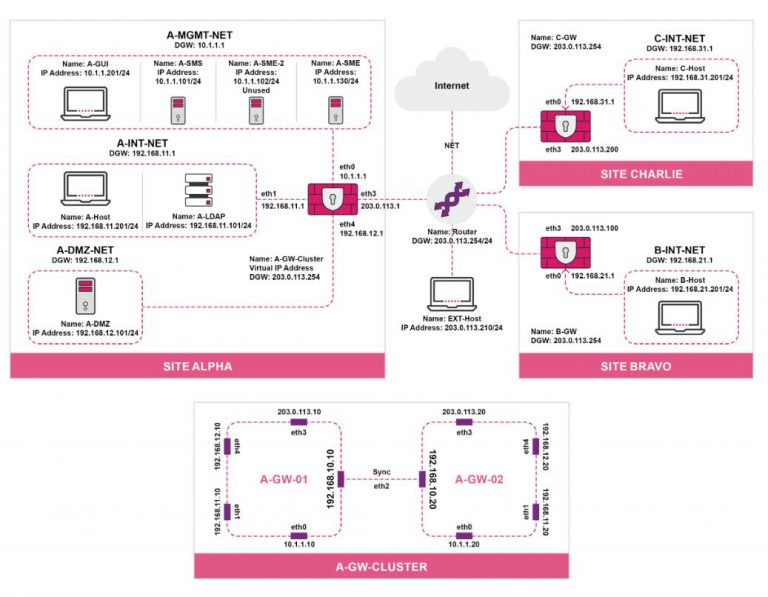Obiettivi | Certificazione | Contenuti | Tipologia | Prerequisiti | Durata e Frequenza | Docenti | Modalità di Iscrizione | Calendario

Il Corso Check Point CCTE Troubleshooting Expert è un programma formativo avanzato, pensato per partecipanti desiderosi di approfondire le loro competenze nella diagnosi e risoluzione dei problemi relativi alle soluzioni di sicurezza Check Point. Nel corso, i partecipanti si confrontano con lezioni teoriche e pratiche che coprono un’ampia gamma di argomenti legati all’analisi e risoluzione di problematiche complesse in sistemi di sicurezza Check Point.
I partecipanti apprendono come affrontare e risolvere problemi avanzati legati a tecnologie e strumenti Check Point, come firewall, VPN, intrusion prevention system (IPS), mobile access, data loss prevention (DLP) e gestione unificata delle minacce (UTM). Il corso si focalizza sullo sviluppo di competenze pratiche per identificare e risolvere problematiche complesse che possono sorgere durante l’installazione, configurazione e gestione delle soluzioni di sicurezza Check Point.
Grazie a un mix di lezioni, dimostrazioni pratiche e laboratori, i partecipanti acquisiscono una conoscenza approfondita delle metodologie e delle tecniche avanzate di troubleshooting per proteggere le reti aziendali dagli attacchi informatici. Il corso contribuisce alla preparazione dell’esame di Certificazione Check Point Troubleshooting Expert (CCTE).
Contattaci ora per ricevere tutti i dettagli e per richiedere, senza alcun impegno, di parlare direttamente con uno dei nostri Docenti (Clicca qui)
oppure chiamaci subito al nostro Numero Verde (800-177596)
Obiettivi del corso
Di seguito una sintesi degli obiettivi principali del Corso Check Point CCTE Troubleshooting Expert:
- Approfondire la comprensione delle architetture di sicurezza Check Point, con particolare attenzione alle configurazioni avanzate di firewall e VPN.
- Acquisire competenze pratiche nell’uso di sistemi di prevenzione delle intrusioni (IPS) e nella gestione di soluzioni di mobile access e Data Loss Prevention (DLP).
- Sviluppare abilità nella diagnosi e risoluzione di problemi tecnici specifici legati all’Unified Threat Management (UTM) e alle configurazioni di sicurezza di rete.
- Imparare le tecniche avanzate per la protezione delle reti aziendali, inclusa l’analisi e la mitigazione di attacchi informatici complessi.
- Rafforzare le competenze nella gestione e nell’analisi di eventi di sicurezza, utilizzando strumenti come il Security Information and Event Management (SIEM).
Certificazione del corso
Esame Check Point CCTE Troubleshooting Expert; Questo esame è una valutazione approfondita delle competenze dei candidati nell’identificare, analizzare e risolvere problemi complessi nelle soluzioni di sicurezza Check Point. Questo esame testa la capacità dei candidati di lavorare con architetture di sicurezza avanzate, gestire configurazioni di firewall e VPN, e utilizzare sistemi di prevenzione delle intrusioni (IPS). Inoltre, l’esame richiede una conoscenza approfondita delle soluzioni di mobile access, Data Loss Prevention (DLP) e Unified Threat Management (UTM). I candidati devono dimostrare la loro abilità nell’analisi e nella mitigazione di attacchi informatici, nonché nella gestione e nell’analisi di eventi di sicurezza tramite strumenti di Security Information and Event Management (SIEM). L’esame CCTE è un test rigoroso che richiede ai candidati di dimostrare una comprensione pratica e teorica avanzata delle tecnologie e delle pratiche di sicurezza Check Point.
Contenuti del corso
- Identify and use Linux-based and Check Point commands and tools for system monitoring,file editing and file viewing.
- Identify and use the appropriate troubleshooting and debug commands/tools to resolve advanced Management Server and API Server issues.
- Investigate and troubleshoot traffic or security-related issues using logs and events monitoring tools.
- Identify and use the appropriate troubleshooting and debug commands/tools to resolve advanced Security Gateway issues.
- Demonstrate an understanding of avanced troubleshooting tools and techniques for kernel debugging.
- Identify and use the appropriate troubleshooting and debug commands/tools to resolve advanced Access Control issues.
- Identify and use the appropriate troubleshooting and debug commands/tools to resolve advanced Identify Awareness issues.
- Identify and use the appropriate troubleshooting and debug commands/tools to resolve advanced Site-to-Site VPN Troubleshooting issues.
- Identify and use the appropriate troubleshooting and debug commands/tools to resolve advanced Client-to-Site VPN Troubleshooting issues.
Attività Laboratoriali
- Collect and read live and historical CPView data
- Troubleshoot CPM and SmartConsole login issues
- Restore a Management High Availability environment from a temporary Primary Down condition
- Troubleshoot SmartLog processes
- Collect and interpret user mode debugs
- Collect and interpret kernel debugs
- Debug Unified Policy Inspection in kernel to understand match process
- Debug the Identify Awareness user mode processes
- Collect and interpret Site-to-Site VPN Debugs
- Collect and interpret Remote Access VPN Debugs
Tipologia
Corso di Formazione con Docente
Docenti
I docenti sono Istruttori Autorizzati Check Point e in altre tecnologie IT, con anni di esperienza pratica nel settore e nella Formazione.
Infrastruttura laboratoriale
Per tutte le tipologie di erogazione, il Corsista può accedere alle attrezzature e ai sistemi presenti nei Nostri laboratori o direttamente presso i data center del Vendor o dei suoi provider autorizzati in modalità remota h24. Ogni partecipante dispone di un accesso per implementare le varie configurazioni avendo così un riscontro pratico e immediato della teoria affrontata. Ecco di seguito alcuni scenari tratti dalle attività laboratoriali:

Dettagli del corso
Prerequisiti
Si consiglia la partecipazione al Corso Check Point CCSE.
Durata del corso
- Durata Intensiva 2gg;
Frequenza
Varie tipologie di Frequenza Estensiva ed Intensiva.
Date del corso
- Corso Check Point CCTE (Formula Intensiva) – Su richiesta – 09:00 – 17:00
Modalità di iscrizione
Le iscrizioni sono a numero chiuso per garantire ai tutti i partecipanti un servizio eccellente.
L’iscrizione avviene richiedendo di essere contattati dal seguente Link, o contattando la sede al numero verde 800-177596 o inviando una richiesta all’email [email protected].


